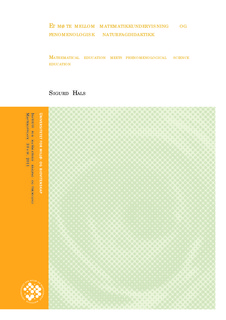| dc.contributor.author | Hals, Sigurd Johannes | |
| dc.date.accessioned | 2012-04-27T11:56:09Z | |
| dc.date.available | 2012-04-27T11:56:09Z | |
| dc.date.issued | 2012-04-27 | |
| dc.identifier.uri | http://hdl.handle.net/11250/188831 | |
| dc.description.abstract | I denne oppgaven spør jeg: Hvordan kan prinsipper fra fenomenologisk naturfagundervisning inspirere matematikkundervisning? Hva kan kjennetegne fenomenologisk matematikkundervisning? Med utgangspunkt i litteratur om fenomenologisk naturfagundervisning har jeg intervjuet fem lærere. Det er lærerens perspektiver som i hovedsak drøftes opp mot prinsipper i fenomenologisk naturfagundervisning.
Det utpeker seg tre områder fra analysen av intervjuene:
- Matematikkens realitet og kvalitet
- Matematikkens kognitive aktivitet
- Matematikken som verktøy
Matematikkens realitet og kvalitet går inn på hvordan matematikken kan oppleves reell og hvordan denne realitet kan være opphav til kognitive erfaringer.
Matematikkens kognitive aktivitet tar for seg hvordan tenkningen forholder seg til de fysiske fenomener og hvordan denne relasjon er med i utviklingen av de abstrakte matematiske fenomener.
Matematikken som verktøy handler om hvordan matematikken og erfaringer av den, bidrar til å erkjenne og forstå den verden som omgir oss. I konklusjonen viser jeg hvordan disse perspektiver ved matematikken kan bidra til å utvikle en utvidet læringsmodell inspirert av den fenomenologiske naturfagundervisningen. Denne utvidete modellen tar med seg matematikkens abstrakte verden, hvor abstrakte fenomener kan være kilde til hva jeg kaller kognitive erfaringer. Denne utvidete modellen tydeliggjør relasjonen mellom matematikkfaget og naturfaget, og hvordan kunnskapene i disse fagene henger sammen. Et vesentlig punkt som kommer frem er hvordan også læring i matematikk er en prosess som kan romme fenomenologiske erfaringer og opplevelser. In this thesis I am putting forward the following questions: How can the principles from phenomenological science education inspire mathematical education? What might
characterize phenomenological math-teaching? Starting from literature on phenomenological science education, I have interviewed five mathteachers. My main focus is on the perspectives of the teachers related to the principles of
phenomenological science education.
From the analysis of the interviews three aspects emerge:
- The reality and the quality of mathematics
- The cognitive activity related to mathematics
- Mathematics as tool
The reality and the quality of mathematics is about how mathematics can be perceived as real and how this reality can be the fundament for cognitive experiences
The cognitive activity related to mathematics focus on how the thinking relates to the physical phenomenon and how this relationship is a part of developing abstract mathematical phenomena.
Mathematics as tool is about how mathematics and the experiences of it can contribute to the perception and the understanding of the surrounding world.
In the conclusion I discuss how these aspects of mathematics can contribute to the
development of a teaching-model inspired by the phenomenological teaching of science
education. This extension includes the abstract world of mathematics, where abstract phenomena can be the source of what I describe as cognitive experiences.
This extended model reveals the relations between the mathematical education and those of science education, and how their knowledge is intertwined. An important aspect that emerges is how the process of teaching mathematics also can contain
phenomenological perceptions and experiences. | no_NO |
| dc.language.iso | nob | no_NO |
| dc.publisher | Norwegian University of Life Sciences, Ås | |
| dc.subject | matematikk | no_NO |
| dc.subject | didaktikk | no_NO |
| dc.subject | mathematics | no_NO |
| dc.subject | education | no_NO |
| dc.title | Et møte mellom matematikkundervisning og fenomenologisk naturfagdidaktikk | no_NO |
| dc.title.alternative | Mathematical education meets phenomenological science education | no_NO |
| dc.type | Master thesis | no_NO |
| dc.subject.nsi | VDP::Mathematics and natural science: 400::Mathematics: 410 | no_NO |
| dc.source.pagenumber | 82 | no_NO |
